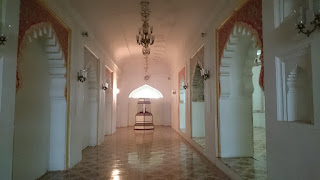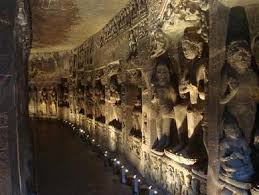Monday, March 20, 2017
Tuesday, January 31, 2017
Soneri Mahal Aurangabad
old historic monument now converted into museum houses:-
An old historic monument now converted into museum houses a variety of ancient indian pottery, dresses, and remains of local palaces and antiques of daily use. a number of sculptures and reliefs from the local excavations university campus and is on the way to aurangabad caves.are also on display. it is located within dr. babasaheb ambedkar marathwada.
History:-
The building is situated in paharsinqpur, a suburb Aurangabad at a distance of about half K.M. To the north west of the famous Bibi-ka Maqbara.
This was -roe the residence of maharaja of cliched who helped Aurangzeb in the inquest of the Deccan. The building is in stone and lime and has a high plinth. It is sad in have obtained it's name soneri mahal from the paintings of gold which at one time decorated it.
paintings:-
paintings:-
It is a spacious building of lwo storegs, constructed in and typical Rajput style. The main gateway is in tact but compound wall has practically disappeared.
Rajput style construction:-
Rajput style construction:-
The soneri mahal was constructed by a bandaland chief who come with Aurangzeb into the Dakhan. The mahal is located in paharsingpura which is a suburb of Aurangbad. The structure is made of stone and lime. The mahal has a high pedestal but it is now in dilapidations.
stone and lime structure :-
stone and lime structure :-
The paintings in the mahal were once painted of gold and so the name soneri mahal.The soneri mahal finishes the mughal grandness with it's remnants of glory that rejects to fade. Indians are charged Rs 10 and foreigners Rs 100 as entrance fee and the timings are from 8am to 6pm.
The ellora Ajanta festival takes place in Aurangabad's 17th century architectural marvel,the soneri mahal haveli virtuoso indian musicians and dances perform classical and dances, instrumental pieces and songs,while hundreds of stalls in kola gram sell regional artisans work.
Best Time To Visit:-
1. Timings : 8:00am To 6:00pm
2. For Indians : Rs. 10/- per head
3. For Foreigners : Rs. 100/- per
head
Map Aurangabad to Soneri Mahal:-
Labels:
Aurangabad,
Maharashtra
Location:
Aurangabad, Maharashtra, India
Monday, January 30, 2017
Bibi Ka Maqbara is another one famous spot in aurangabad
The Bibi Ka Maqbara (English:"Tomb of the Lady") is a tomb located in Aurangabad, Maharashtra, India. It was commissioned by the sixth Mughal emperor Aurangzeb in 1660, in the memory of his first wife and chief consort, Dilras Banu Begum.
striking resemblance to the famous Taj Mahal:-
It bears a striking resemblance to the famous Taj Mahal, the mausoleum of Aurangzeb's mother, Mumtaz Mahal. It is notable that Aurangzeb never raised monumental edifices during his half-a-century reign, but made just one exception, that is, to build the mausoleum of his wife.
He was not very interested in architecture, though he had built the small, but elegant, Pearl Mosque at Delhi. The Bibi Ka Maqbara was the largest structure that Aurangzeb had to his credit.
Dakkhani Taj (Taj of the Deccan):-
The comparison to the Taj Mahal has often obscured its very own considerable charm. Due to the strong resemblance, it is also called the Dakkhani Taj (Taj of the Deccan). The Bibi Ka Maqbara is the principal monument of Aurangabad and its historic city.
An inscription found on the main entrance door mentions that this mausoleum was designed and erected by Ata-ullah, an architect and Hanspat Rai, an engineer respectively. Ata-ullah was the son of Ustad Ahmad Lahauri, the principal designer of the Taj Mahal.
History:-
Bibi ka Maqbara is believed to have been built between 1651 and 1661 C.E. According to the "Tarikh Namah" of Ghulam Mustafa, the cost of construction of the mausoleum was Rs. 6,68,203-7 (rupees six lakh, sixty-eight thousand, two hundred three and seven annas) – Aurangzeb allocated only Rs. 7,00,000 for its construction.
An inscription found on the main entrance door mentions that this mausoleum was designed and erected by Ata-ullah, an architect and Hanspat Rai, an engineer respectively. The marble for this mausoleum was brought from mines near Jaipur.
According to Ta-vernier, around three hundred carts laden with marble, drawn by at least 12 oxen, were seen by him during his journey from Surat to Golconda. The mausoleum was intended to rival the Taj Mahal, but the decline in architecture and proportions of the structure (both due to the severe budgetary constraints imposed by Aurangzeb) had resulted in a poor copy of the latter.
Maqbara pics :-
Wall art pics:-
Ceiling Art:-
Entry view:-
Map from aurangabad to maqbara:-
Video:-
Labels:
Aurangabad,
Maharashtra.
Location:
Aurangabad, Maharashtra, India
Grishneshwar temple Aurangabad
This pilgrimage site is located in
Ellora (also called Verul),
less than a kilometer from Ellora
Caves .
Grishneshwar temple:-
This temple was destroyed by the
Delhi Sultanate during the Hindu-Muslim wars of 13th and 14th-century. The
temple went through several rounds of rebuilding followed by re-destruction
during the Mughal-Maratha conflict. It was rebuilt in the current form in the
18th century under the sponsorship of a Hindu queen Rani Ahalyabai of Indore,
after the fall of the Mughal
Empire.
sanctum core of the temple:-
sanctum core of the temple:-
It is presently an important and active pilgrimage site of
the Hindus and attracts long lines of devotees daily. Anyone can enter the
temple premises and its inner chambers, but to enter the sanctum sanctorum core of the temple, the local Hindu tradition demands that men must
go bare chested.
The Grishneswar temple is an
illustration of south Indian temple architectural style and structure. The
temple, built of red rocks, is composed of a five tier shikara. The temple was
re-constructed by Maloji
Bhosale of Verul, (grandfather of Shivaji) in the 16th century
and later again by queen Ahilyabai
Holkar in the 18th century. She
is credited with rebuilding some of major Hindu temples such as the Kashi
Vishvanath temple in Varanasi, a Vishnu temple in Gaya, and a much larger Shiva
Jyotirlinga temple in Somnath.
smallest Jyotirlinga temple in India:-
smallest Jyotirlinga temple in India:-
This 240 ft x 185 ft temple is the
smallest Jyotirlinga temple in India. Halfway up the temple, Dashavataras of
Vishnu are carved in red stone. A court hall is built on 24 pillars. On these
pillars there are carvings summarizing various legends and mythologies of Shiva.
Map Aurangabad to Grishneshwar:-
Labels:
Aurangabad,
Maharashtra.
Location:
Aurangabad, Maharashtra, India
Sunday, January 29, 2017
Aurangabad Ajanta and Ellora Caves
The ajanta caves in aurangabad district of maharashtra state
of india are about 30 rock-cut buddhist cave monuments which date from the 2nd
century.
The caves include paintings and rock cut sculptures described
as among the finest surviving examples of ancient indian art, particularly
expressive paintings that present emotion through gesture, pose and form.
ajanta caves:-
The ajanta caves constitute ancient monasteries and worship
halls of different buddhist traditions carved into a 250 feet wall of rock, caves also present paintings depicting the past lives and
rebirths of the buddha, pictorial tales from aryasura's jatakamala, as well as
rock-cut sculptures of buddhist deities in vogue between the 2nd century.
Rock art:-
Rock art:-
Textual records suggest that these caves served as a monsoon
retreat for monks, as well as a resting site for merchants and pilgrims in
ancient india.
while vivid colors and mural wall painting were abundant in
indian history as evidenced by historical records , ajanta form the largest
corpus of surviving ancient indian wall-painting,The ajanta caves site are mentioned in the memoirs of several
medieval era chinese buddhist travelers to india and by a mughal era official
of akbar era in early 17th century,they were covered by jungle until accidentally
"discovered" and brought to the western attention in 1819 by a
colonial british officer on a tiger hunting party.
The ajanta caves are located on the side of a rocky cliff that
is on the north side of a u-shaped gorge on the small river waghur, round the
gorge are a number of waterfalls, which when the river is high are audible from
outside the caves.
with the ellora caves, ajanta is the major tourist attraction
of the marathwada region of maharashtra. they are about 60 kilometres from bhusaval junction railway station, 104
kilometres from the city of aurangabad.
Map of Ajanta Caves:-
Walkway:-
Scenes form Jataka tales:-
Labels:
Aurangabad,
Maharashtra.
Location:
Aurangabad, Maharashtra, India
Subscribe to:
Comments (Atom)





















































